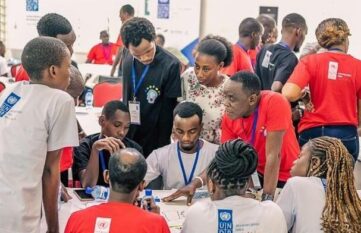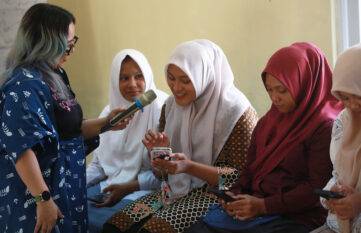Improving resilience of farmers with Machine Learning for Earth Observation

Protecting forests, monitoring harvests or controlling the condition of water bodies – the use of machine learning (ML) for Earth Observation (EO) marks advance in agricultural sector. Despite its potential, the application of such technology in Rwanda, like in many low- and middle-income countries, has been restricted due to limited skills and data access.
The “FAIR Forward – Artificial Intelligence for All” initiative, in collaboration with the Rwanda Space Agency and the German Aerospace Agency, has responded by launching the Open Machine Learning for Earth Observation (ML4EO) Training Program.
The program aims to equip 40 students and young professionals with hands-on skills in Machine Learning, Data Science and Earth Observation, enabling them to create data-driven solutions for Rwanda’s agricultural sector.
Participants of the program undergo comprehensive training in ML techniques for EO data and product development methodologies.
As Amon, a participant of the program, reflected:
“I gained invaluable insights in the ML4EO course, equipping me with the skills to navigate the intersection of machine learning and Earth observation. This experience has been and will be pivotal for my career, opening doors to new possibilities and propelling my journey in the field of data science and environmental applications.”
Amon, participant of the program
Additionally, the participants are given the opportunity to develop proposals for ML4EO products, with the most promising receiving seed funding to create Minimum Viable Products (MVPs). Currently, three winning teams have proceeded to develop their MVPs.
For instance, one of the teams has been actively working on soil moisture prediction models. They are integrating satellite imagery with infield remote monitoring systems to overcome the challenge of scarce training data for soil moisture in Rwanda. Their efforts are part of a larger initiative aimed at developing a comprehensive data platform to provide actionable insights to farmers through SMS and IVR systems.
Another team is working towards creating an ML-based rainfall forecasting model. They have collected a decade’s worth of rainfall data and are training machine learning models to predict rainfall with high precision.
The program has not only delivered technical knowledge but has also shown a model for collaboration and sustainable knowledge management through the ML4EO network. The network supports a community of practice for professional exchange, capacity building, and networking. Chaired by the Rwandan Space Agency, GIZ and Carnegie Mellon University Africa (CMU), the group maintains an online slack channel to facilitate dialogue and meets regularly to host lectures and coding sessions.
Inspired by the first edition of this program that ran in South Africa in 2022, FAIR Forward Rwanda is laying the groundwork for improved resource management in Rwanda and sets a precedent for the use of AI in Earth Observation, indicative of a broader global trend towards data-driven practices in agriculture and beyond.
Administered by GFA Consulting Group, the program engaged local educational institutions, notably CMU Africa, in charge of designing and delivering the curriculum content to assure local community building and long-term sustainability.
The curriculum will soon be available for free on atingi, with some modules available as self-paced e-learning courses.
For more detailed information on the curriculum, lessons learned, replication support, or the ML4EO Network, please contact [email protected].




